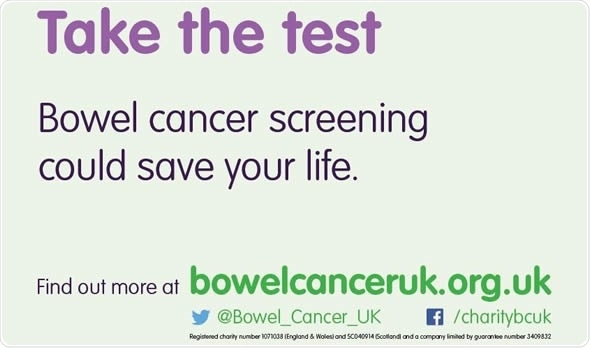FIT (faecal immunochemical test) is a screening test for bowel cancer which detects hidden traces of blood in stools. It is now used in population screening around the world including Italy, The Netherlands, France, Ireland, New Zealand, Australia, Spain, Slovenia, Malta, Japan, parts of Canada, and Southeast Asia.
Currently in the UK, the screening programmes in each of the devolved nations use the guaiac faecal occult blood test (gFOBt) which also detects hidden traces of blood in stools but is a less sensitive test. The UK National Screening Committee recently recommended the introduction of FIT to replace gFOBt, but this is yet to be approved in England, Wales and Northern Ireland, so we are calling for its swift introduction. However, Scotland has already agreed to introduce FIT and is working towards implementation.

The NHS Bowel Cancer Screening Programme is designed to identify bowel cancer in people who have no symptoms. In England, Wales and Northern Ireland screening is available every two years to people aged 60 – 74. In Scotland it is available for those aged 50 -74. Eligible participants are sent a test in the post every two years. The current screening kit requires individuals to collect three samples of poo over two weeks. Regular screening can lead to detecting bowel cancer early when the chances of survival are high.
How does the test work?
Like the current gFOBt test, FIT requires patients to collect a stool sample at home but FIT requires only one sample rather than three required by gFOBt. It is easy and hygienic to post the completed test for analysis in a laboratory.
FIT works by detecting tiny amounts of blood in the stool that could indicate cancer or large polyps, growths that can develop into cancer. FIT measures the level of blood in the stool and is sensitive to human haemoglobin whereas gFOBt only indicates the presence of blood. Because of this, it is more accurate than the current gFOBt.
It is also a quantitative test and so, unlike the current gFOBt, the cut-off level for detecting blood in the stools can be adjusted to change the sensitivity of FIT.
FIT has a relatively quick processing time between obtaining a sample and receiving a result. This turnaround time means that patients could receive rapid reassurance if their result is negative and also be referred quickly for endoscopy should their result be positive.

Currently, how many of those invited actually take part in the NHS bowel cancer screening programme in the UK? What impact do you think the FIT will have on this figure?
At the moment in some areas of the UK only a third of those who receive a test complete it, meaning thousands of people are missing out on the chance to detect bowel cancer early when it is easier to treat.
That’s why, during Bowel Cancer Awareness Month in April we are focusing on screening. As 2016 marks the ten year anniversary of the introduction of bowel cancer screening in England, we are urging people to spread the word among their family, friends and colleagues to take the test.
As FIT only requires one sample and the collection method is simpler, FIT has been shown to increase the number of people participating in the Bowel Cancer Screening Programme, particularly for previous non-responders and first-timers, as well as hard to reach groups, such as ethnic and deprived communities. Results from a recent pilot study showed that overall participation in FIT for first time invitees was 61 per cent compared with 50 per cent for the current test.
One of the benefits of FIT is that because it is a quantitative test, sensitivity levels can be varied so that more cancers or their precursors, polyps, can be detected. However we know that a high sensitivity level will have a significant impact on colonoscopy services, particularly as many endoscopy units are currently struggling to cope with an increasing demand for the service. Therefore there is likely to be a staged implementation with sensitivity levels only being increased once endoscopy services can cope with the additional demand. Whilst this is pragmatic, it is essential that this does happen or it will have limited additional impact and lives will continue to be lost needlessly.
How important is the early diagnosis of bowel cancer on survival chances?
Early diagnosis is key because bowel cancer is treatable and curable especially if diagnosed early. In fact nearly everyone diagnosed at the earliest stage will survive bowel cancer, yet this drops significantly as the disease develops.
What role does screening play in detecting bowel cancer in the earliest stages? How accurate is the FIT?
Screening has a vitally important role in detecting bowel cancer early as it can detect bowel cancer before it becomes symptomatic, which can often imply later stage disease. There is a marked stage shift in those detected through screening to those detected after symptomatic presentation. A third of people (34 per cent) who are diagnosed with bowel cancer through screening are diagnosed at stage 1, the earliest and most treatable stage, compared to only six per cent of those who are diagnosed through emergency admission to hospital.
One of the reasons we have been campaigning for the introduction of FIT is because of its accuracy. A FIT pilot study demonstrated a significant, two-fold increase in detection of cancers and a four-fold increase in advanced adenomas when implemented at 20 milligrams of haemoglobin per gram of faeces or 20μg/g. Whilst it is unlikely that the test will be introduced at such a sensitive level, it does highlight the potential gains that are possible by implementing FIT.
In contrast, the gFOBt only detects up to 50 per cent of bowel cancers in patients with no symptoms.
You recently described colonoscopy services in the UK as struggling. Why do you think this is the case?
There is an increasing demand for colonoscopy services due to an ageing population and roll-out of screening programmes, and it’s vital that these issues are resolved before they reach crisis point. It’s worth noting that currently 24 per cent of bowel cancers are detected after an emergency admission when outcomes are frequently poorer. We need to change this and ensuring people can access timely diagnostic testing is part of the solution.
In our report, ‘Diagnosing bowel cancer early: right test, right time’, we highlighted the increasing demand and how the lack of capacity is impacting on waiting times. Waiting for a diagnostic test can be a very stressful time and so it is important that people are not kept waiting more than six weeks.
Added to this are other issues such as the difficulty in qualifying for an urgent referral and varying quality in services.
It is also impacting on our ability to provide adequate surveillance screening for high risk groups, such as those with genetic conditions such as Lynch syndrome. Research has shown that services for people at high risk are at best patchy and that needs resolving quickly.
The lack of capacity within our endoscopy service is a major challenge across the UK and over the last few years, there appears to have been a great deal of talk but not a lot of action in terms of resolving it. We need a national endoscopy training programme (200 non medical endoscopists is a good start but not enough) and a clear national strategy for addressing this quickly, if we are serious about saving lives from bowel cancer.
What’s your vision for Bowel Cancer UK moving forwards?
Last year, we announced an ambitious new agenda to become the UK’s leading bowel cancer research charity, dedicated to stopping bowel cancer for good.
This move into research will focus on improving access to early diagnosis, and best treatment and care, by unlocking the reasons people die, piece by piece.
On World Cancer Day (4 February 2016) we launched our new 2016 research strategy and outlined a new research project bringing together 100 clinicians and scientists to identify critical gaps in current research into bowel cancer which, if addressed, we believe will help save the lives of thousands of people diagnosed with the disease.
This landmark study will be the most comprehensive review of bowel cancer research ever to take place in the UK and will be chaired by Professor Richard Wilson, Clinical Director, Northern Ireland Cancer Trials Centre and Network, Queen's University Belfast and Ian Tomlinson, Professor at Wellcome Trust Centre for Human Genetics, University of Oxford and is being carried out in partnership with the NCRI CSG and the ACPGBI.
Where can readers find more information?
For more information visit bowelcanceruk.org.uk
About Deborah Alsina
Deborah began her career in publishing and has subsequently worked in the voluntary sector for nearly 25 years. She has worked with a broad range of organisations from academic think tanks to charities working on international human rights issues. Deborah joined Bowel Cancer UK as Director of Services and Strategy in June 2008, a year after losing her father to the disease and was appointed Chief Executive a year later.

A determined advocate for earlier diagnosis and best treatment and care for all, Deborah represents the charity in numerous policy advisory committees relating to bowel cancer and also works with international partners on issues of shared concern. She is also increasingly involved in exciting new research collaborations. Frequently asked to give presentations and speeches about bowel cancer, Deborah is also proud to act as Bowel Cancer UK's lead spokesperson.